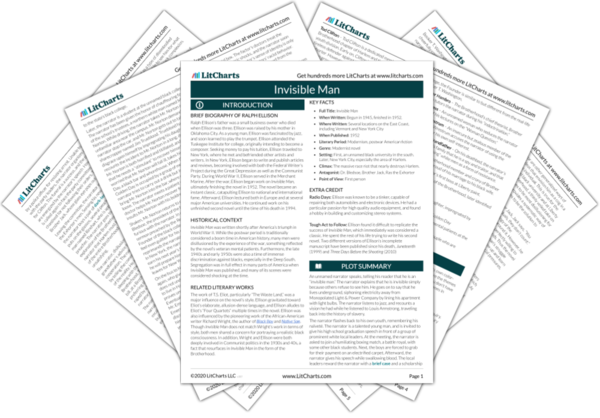Throughout the novel, the narrator encounters powerful institutions and individuals, all of which are bent on maintaining influence over events. At the novel’s beginning the narrator is exposed to the white power elite of his town, who act one way in the public eye but have no shame about their racist and sexist actions within a private club. The very moment they sense a threat from the narrator (when he mentions the word “equality”), they prepare to destroy him. These men arm themselves with the story that they are upstanding businessmen and community leaders, but this narrative is in contradiction with their naked desire to maintain power.
The Brotherhood is one of the best examples of another group that uses a powerful narrative that seems to perfectly explain the world. By suggesting that all events are part of a science of history that can be perfectly understood, they seek to impose their subjective vision on others who buy into their philosophy. However, this ideology is flawed: although the Brotherhood is originally interested in combating oppression, it is clear that characters like Brother Jack come to relish their power above any other altruistic motive.
The black community is no freer from the self-interested drive to consolidate and maintain power at all costs – only they are limited by white oppression. Dr. Bledsoe is an example of a figure the narrator looks up to, only to find out that he is more interested in holding onto the enclave of power he has carved out than in the ideals of humility and cooperation he espouses in public. Later, the figure of Rinehart comes to represent a similar impulse within the black community: a cynical attempt to profit in the short term by exploiting the ignorance of others.
He is a pimp, gambler, racketeer, lover and preacher all in one, but only because he can rely on the weakness and desperation of other members of the black community. At the novel’s end, the narrator remarks, “I’ve never been more loved or appreciated than when…I’ve tried to give my friends the incorrect, absurd answers they wished to hear.” By retreating into the underground, the narrator hopes to distance himself these stories that destroy individual integrity while shoring up power structures.
Power and Self-Interest ThemeTracker

Power and Self-Interest Quotes in Invisible Man
I never told you, but our life is a war and I have been a traitor all my born days, a spy in the enemy’s country…Live with your head in the lion’s mouth. I want you to overcome ‘em with yeses, undermine ‘em with grins, agree ‘em to death and destruction, let ‘em swoller you till they vomit or bust wide open.
I didn't understand in those pre-invisible days that their hate, and mine too, was charged with fear. How all of us at the college hated the black-belt people, the "peasants," during those days! We were trying to lift them up and they, like Trueblood, did everything it seemed to pull us down.
The white folk tell everybody what to think—except men like me. I tell them; that’s my life, telling white folk how to think about the things I know about.
Why did he choose to plunge into nothingness, into the void of faceless faces, of soundless voices, lying outside history?...But not quite, for actually it is only the known, the seen, the heard and only those events that the recorder regards as important that are put down, the lies his keepers keep their power by.
Our job is not to ask them what they think but to tell them!
His world was possibility and he knew it. He was years ahead of me and I was a fool…The world in which we lived was without boundaries. A vast seething, hot world of fluidity, and Rine the rascal was at home. Perhaps only Rine the rascal was at home in it.
I looked at Ras on his horse and at their handful of guns and recognized the absurdity of the whole night and of the simple yet confoundingly complex arrangement of hope and desire, fear and hate, that had brought me here still running, and knowing now who I was and where I was and knowing too that I had no longer to run for or from the Jacks and the Emersons and the Bledsoes and Nortons, but only from their confusion, impatience, and refusal to recognize the beautiful absurdity of their American identity and mine.
Let me be honest with you—a feat which…I find of the utmost difficulty. When one is invisible he finds such problems as good and evil, honesty and dishonesty, of such shifting shapes that he confuses one with the other…I was never more hated than when I tried to be honest. Or when, even as just now I’ve tried to articulate exactly what I felt to be the truth. No one was satisfied—not even I.
















